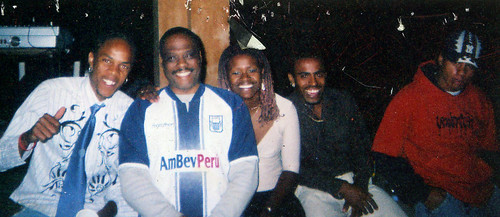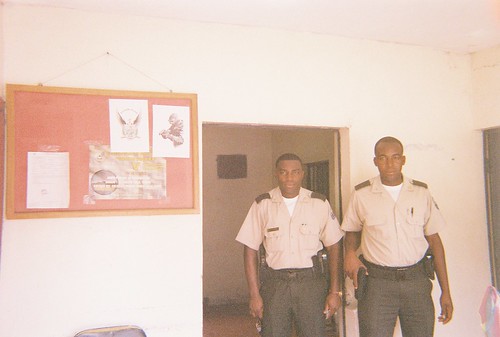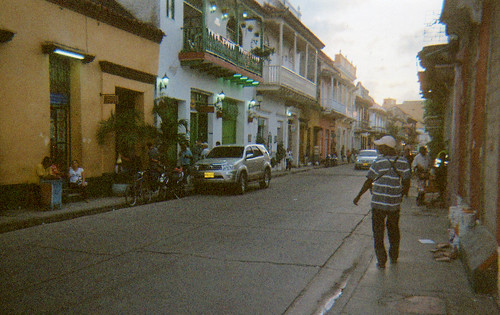Traveling Among Black Latinos in Black Latin America

I am second from the left at a party
in the District of El Carmen, in Chincha, Perú.
As one who has traveled to more than 100 cities in 13 countries, I take pride in avoiding tourism and getting as close to the locals as possible. In my opinion, it is among the locals where you get a real sense of the country's culture. Juan, an Afro-Venezuelan friend said it so well, “the barrio is where the culture is.” However, I'm finding that Perú more than any other country I've visited, with the exception of the Philippines, there is a price to pay.
By living close to the locals, I endure a standard of living that will “annoy” the average tourist.
Although, I make only a modest income with a non-profit organization, people in many countries seem to feel that I'm in the same income bracket as Bill Gates or Donald Trump. As I get closer and more acquainted with the people, the more I find that I'm approached like an ATM machine. One lady with whom I have a very good rapport, showed me her gas and electric bill asking for help. Then came the big boo-boo, when as planned, I took a trip into neighboring Ecuador for six days and was telling everybody without taking into consideration that this type of travel is unheard of in this community. That really made me look wealthier than I really am and has caused some people to hustle me more.
A dance instructor asked me about my motive for hanging out in a poor, non-tourist area when most visitors from Europe and North America stay in major hotels and go to popular tourist attractions. My response to him was that this is the way I practice my Spanish (by immersion), and at the same time, explore the black Latino experience. You don't get these things living in five-star hotels and hanging around expensive tour guides. Speaking of tour guides, I found it more more rewarding and more economical to hire a struggling citizen who can use some extra cash and bring me closer to the real people of the land.
 Cops in the all black town of Juncal, Ecuador wanted to know
Cops in the all black town of Juncal, Ecuador wanted to knowwhat I was doing so far off the beaten path.
To get around, I prefer as much as possible, to use the same type of public transportation as the locals. Of course, dressing down is important because you don't want to be marked as a tourist with fancy clothes and bling-bling; it invites robbers, cheats, and pickpockets. Most of my time was spent among the so-called lower class. On two occasions I ventured into one of Lima, Perú's roughest neighborhoods, La Victoria, where Perú's famous, historically black soccer team Alianza Lima have their stadium. I went into the area wearing an Alianza Lima team jersey. Thus instead of being harassed, I was cheered. People shook my hand. Others drove by honking their horns and giving me the thumbs up shouting "ALIANZA LIMA-A-A-A-A-A-A-A! I wonder if they thought I was one of the players. After all, I did fit the profile--black and athletic :-)
By living close to the locals, I endure a standard of living that will “annoy” the average tourist. As a result, I have more spending money to enjoy myself, and at the same time, help others who need the help in a way that I can afford. It was a total joy, a heartfelt pleasure, and worth every penny to see how they were enjoying my company and my treats as I achieved my goal of making lifetime friends, learning the cultures, but most importantly, improving my Spanish.


Bill, I commend you for your method of connecting with the people in the many countries you have visited. We are in most ways more alike than different, but we never learn these basic facts if we isolate ourselves from the everyday reality and experiences of people in the community. And let's face it, most Afro-Latinos are living at the very bottom of the social strata in those countries. They aren't to be found in the museums, art galleries, and upscale restaurants, unless of course they are employed to do the menial labor. The way to meet them is in the barrios and by using public transportation--which in my experience is not for the faint of heart.
ReplyDeleteOurstorian, LOL! No, this is NOT for the faint-of-heart. Well said!
ReplyDeleteI live in Arequipa, Perú. I can count on one hand the number of AfroPeruvians I've met in this city. On the rare occasion I meet one, they're usually selling stuff downtown or in the street (not unlike many indigenous people here). When I walk in the street by myself, I get stared at, and many taxi drivers call out to me ("moreno, negrito, familia" etc.) It's not hostile, but something that definitely makes me aware I'm an outsider. Interestingly, when I talk with Arequipeños, they assume I'm from Brazil or Colombia before Perú. It's even a bigger shock when they find out I'm from North America.
ReplyDeleteI've found that, at times, when people find out you're from the US, the first thing that pops in their head is money. Of course that goes for foreigners in general. One of my students told me of a sign he once saw at a restaurant that said the following:
jugo de naranja S/.1.50
orange juice $2.00
Yes, that's DOLLARS for the (gringo) orange juice. I understand and agree with capitalizing on tourism as an industry, especially for a poor country like Perú.
I agree that when you get OUT of the tourist places, you're much more likely to get a more true experience of what it's like to live in the country. The Plaza de Armas, albeit beautiful, is one of the most expensive areas of AQP. All of the travel agencies are located there. It has an awe-inspiring cathedral that ALMOST makes takes your mind off the atrocities committed by the Spaniards that led to its creation. Anything you buy in this area will be 'gringo-taxed' despite who you are. Yet just blocks away is the central market of AQP, where prices are a 1/3 to 1/2 cheaper.
JB, thanks for that tip about shopping away from the Plaza de Armas. I go to Perú almost every year and it never dawned on me. By the way, when I ventured in the La Victoria, Lima, I was greeted with, “qué pasó, familia.” A got a good laugh when a woman (her picture is on top) told me that I am not black, I'm “moreno.”
ReplyDeleteI'm curious as to what brought you to Arequipa. You never thought of checking out Chincha?
Kind of a long story... I was looking for a position as an English teacher and the first place that I was offered a job was an institute in AQP... I was coming from Honduras where, as a Black person, you're normal and part of the background (not to say that AfroHondurans have it easy, but at least they're visible). After I got here I found out I was in probably one of the non-Blackest spots in Peru. I've been to Lima and have seen people that look like me, but def not here. Arequipeños are also kinda stuck up. You don't speak to people you don't know. You don't say 'provecho' to diners when you enter a restaurant. The people I know are very sweet, but strangers are not. I lived in Mexico for a month with a family. Despite the location (Guanajuato) and modern-day Mexico not being particularly Black, the people there were extremely friendly. People curious about who I was would ask me. They'd say hi and ask me where I was from and what I was doing there. It was very nice. People invited me to their house to meet their family. AQP is a bit a different.
ReplyDeleteI'm an English (ESL) teacher by trade. I don't know of English schools in Chincha. There are montones in AQP, which is how I ended up here. I will def visit Chincha while I'm in Perú.
Let me know when you visit Chincha and I'll hook you up with the famous Ballumbrosio family. they charge S:/30.00 per night for room and food. The people are very friendly and will turn you on to what is going on in the community. Copy and paste this link to your browser.
ReplyDeletehttp://ahorasecreto.blogspot.com/2011/01/el-carmen-peru-home-away-from-home.html